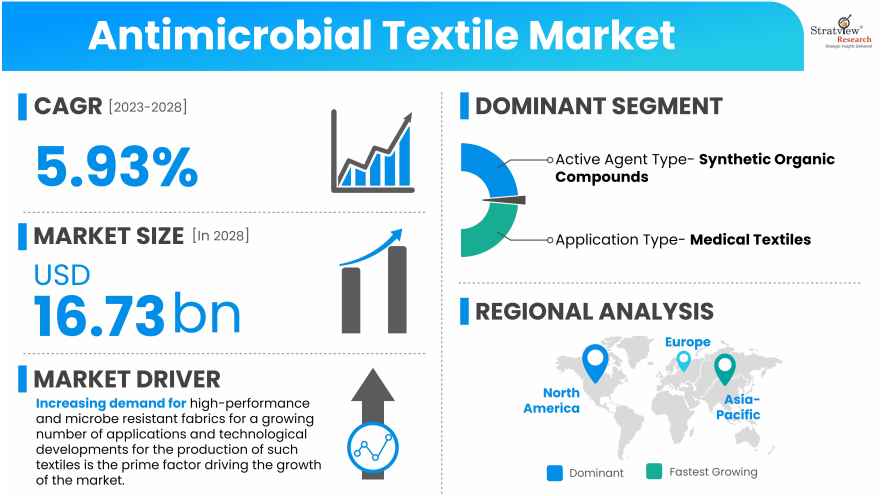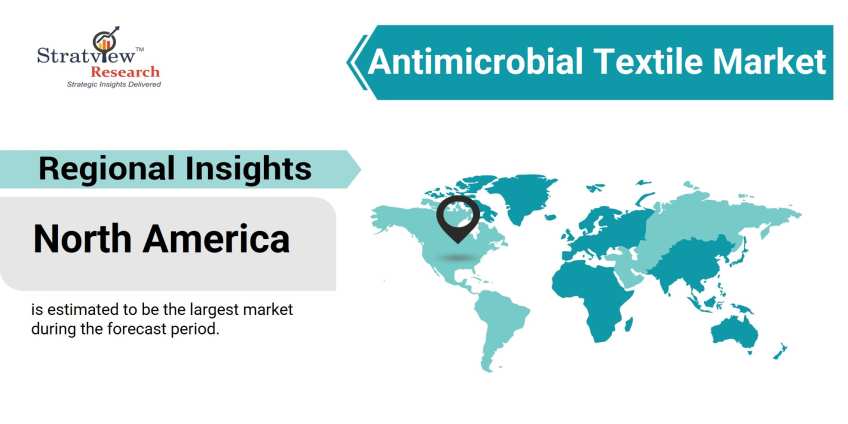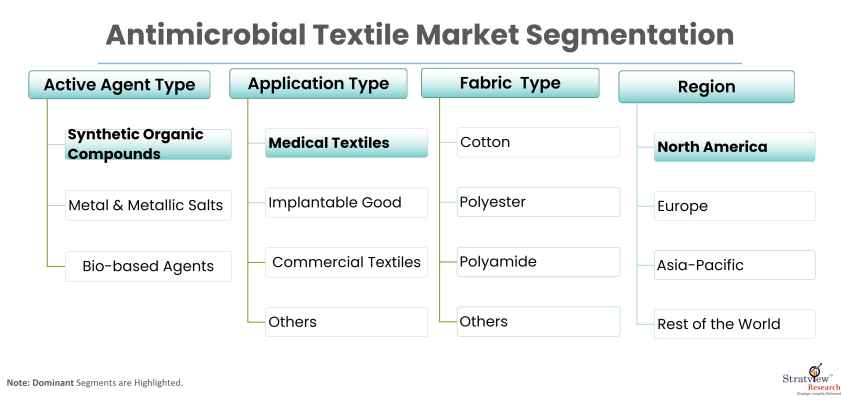Market Insights
"The global antimicrobial textile market size was estimated at USD 11.76 billion in 2022 and is likely to grow at a CAGR of 5.93% during 2023-2028 to reach USD 16.73 billion in 2028."

Want to know more about the market scope? Register Here
Antimicrobial fabrics are made or treated with antimicrobial chemicals that restrain the growth of bacterial microbes on the fabric. There is a tremendous demand for antimicrobial fabrics from the healthcare industry as they are majorly used in clinics and hospitals to maintain the hygiene. Apart from the healthcare industry, antimicrobial fabrics are massively used in the sports industry.
|
Antimicrobial Textile Market Report Overview
|
|
Market Size in 2028
|
USD 16.73 Billion
|
|
Market Size in 2022
|
USD 11.76 Billion
|
|
Market Growth (2023-2028)
|
CAGR of 5.93%
|
|
Base Year of Study
|
2022
|
|
Trend Period
|
2017-2021
|
|
Forecast Period
|
2023-2028
|
Market Dynamics
Market Drivers
The prime factor immensely contributing to the escalating demand for antimicrobial textiles is mainly the increasing demand for high-performance and microbe resistant fabrics for a growing number of applications and technological developments for the production of such textiles.
Segments Analysis
|
Segmentations
|
List of Sub-Segments
|
Dominant and Fastest-Growing Segments
|
|
Active Agent-Type Analysis
|
LEO, MEO, GEO, and HEO
|
The synthetic organic compounds is expected to remain dominant during the forecast period.
|
|
Application-Type Analysis
|
Medical Textiles, Implantable Good, Non-Implantable Good, Commercial Textiles, Apparel, Home Textiles, Industrial Textile, and Others
|
The medical textile segment dominates the market during the forecast period.
|
|
Regional Analysis
|
North America, Europe, Asia-Pacific, and Rest of the World
|
North America is estimated to remain the largest market during the forecast period.
|
Active Agent Trends
"The synthetic organic compounds segment accounted for the largest market share."
The market is segmented as synthetic organic compounds, metal & metallic salts, and bio-based active agents. The synthetic organic compounds segment held the largest share of the market in 2022, and is expected to remain dominant during the forecast period. Synthetic organic compounds have low cost compared to metal & metallic salts and bio-based active agents. Synthetic organic compounds mainly include quaternary ammonium compounds, triclosan, and polyhexamethylene biguanides. The excellent efficiency of these compounds against a wide array of microbes is expected to drive the antimicrobial textile market.
Application Trends
"The medical textiles segment accounted for the largest market share."
The antimicrobial textile market is segmented as medical textiles, implantable good, non-implantable good, commercial textiles, apparel, home textiles, industrial textile, and others. The medical textile segment dominates the market, owing to the high risk of infection in healthcare facilities, different agencies such as Center for Disease Control (CDC) along with hospital management have started encouraging the use of antimicrobial fabric in medical-related textiles. Application of medical textile includes attire, sheets & blankets, and surgical supplies & wipes.
Regional Insights
"North America accounted for the largest market share."
North America held a market share of more than 30% in 2022 and is estimated to remain the largest market during the forecast period. The USA, Canada, and Mexico being the key countries with lucrative growth opportunities. The growth of the market is driven by rising consumer awareness regarding spreading of diseases which has led to the demand for better quality material with regard to the maintenance of health and hygiene.

Know the high-growth countries in this report. Register Here.
Critical Questions Answered in the Report
- What are the key trends in the global market?
- How the market (and its various sub-segments) has grown in the last five years and what would be the growth rate in the next five years?
- What is the impact of COVID-19 on the global market?
- What are the key strategies adopted by the major vendors to lead in the market?
- What is the market share of the top vendors?
Key Players
The following are the key players in the antimicrobial textile market (arranged alphabetically).
Note: The above list does not necessarily include all the top players in the market.
Are you the leading player in this market? We would love to include your name. Write to us at [email protected]
Report Features
This report provides market intelligence in the most comprehensive way. The report structure has been kept such that it offers maximum business value. It provides critical insights into the market dynamics and will enable strategic decision making for the existing market players as well as those willing to enter the market.
What Deliverables Will You Get in this Report?
|
Key questions this report answers
|
Relevant contents in the report
|
|
How big is the sales opportunity?
|
In-depth Analysis of the Antimicrobial Textile Market
|
|
How lucrative is the future?
|
Market forecast and trend data and emerging trends
|
|
Which regions offer the best sales opportunities?
|
Global, regional, and country-level historical data and forecasts
|
|
Which are the most attractive market segments?
|
Market Segment Analysis and Forecast
|
|
Which are the top players and their market positioning?
|
Competitive landscape analysis, Market share analysis
|
|
How complex is the business environment?
|
Porter’s five forces analysis, PEST analysis, Life cycle analysis
|
|
What are the factors affecting the market?
|
Drivers & challenges
|
|
Will I get the information on my specific requirement?
|
10% free customization
|
The market is segmented into the following categories.
By Active Agent Type
- Synthetic Organic Compounds
- Metal & Metallic Salts
- Bio-based Agents
By Application Type
- Medical Textiles
- Implantable Good
- Non-Implantable Good
- Commercial Textiles
- Apparel
- Home Textiles
- Industrial Textile
- Others
By Fabric Type
- Cotton
- Polyester
- Polyamide
- Others
By Region
- North America (Country Analysis: the USA, Canada, and Mexico)
- Europe (Country Analysis: Germany, France, the UK, Russia, Spain, and the Rest of Europe)
- Asia-Pacific (Country Analysis: China, Japan, India, South Korea, and the Rest of Asia-Pacific)
- Rest of the World (Sub-Region Analysis: Latin America, the Middle East, and Others)

Want to get a free sample? Register Here
Research Methodology
This strategic assessment report, from Stratview Research, provides a comprehensive analysis that reflects today’s antimicrobial textile market realities and future market possibilities for the forecast period. The report segments and analyzes the market in the most detailed manner in order to provide a panoramic view of the market. The vital data/information provided in the report can play a crucial role for the market participants as well as investors in the identification of the low-hanging fruits available in the market as well as to formulate the growth strategies to expedite their growth process.
This report offers high-quality insights and is the outcome of a detailed research methodology comprising extensive secondary research, rigorous primary interviews with industry stakeholders, and validation and triangulation with Stratview Research’s internal database and statistical tools. More than 1000 authenticated secondary sources, such as company annual reports, fact books, press releases, journals, investor presentations, white papers, patents, and articles, have been leveraged to gather the data. We conducted more than 15 detailed primary interviews with the market players across the value chain in all four regions and industry experts to obtain both qualitative and quantitative insights.
Customization Option
With this detailed report, Stratview Research offers one of the following free customization options to our respectable clients:
Company Profiling
- Detailed profiling of additional market players (up to 3 players)
- SWOT analysis of key players (up to 3 players)
Competitive Benchmarking
- Benchmarking of key players on the following parameters: Product portfolio, geographical reach, regional presence, and strategic alliances.
Custom Research: Stratview Research offers custom research services across sectors. In case of any custom research requirement related to market assessment, competitive benchmarking, sourcing and procurement, target screening, and others, please send your inquiry at [email protected].

